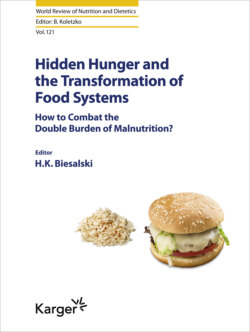Читать книгу Hidden Hunger and the Transformation of Food Systems - Группа авторов - Страница 27
На сайте Литреса книга снята с продажи.
Importance of Appropriate Conditions for Behavioral Change
ОглавлениеThe five leverage points I have mentioned so far all start at one point: enabling people to change their behavior. This aspect is crucial. People are always in the focus, and it is important that they brought along. We also find that these approaches do not suffice to ensure successful prevention and health promotion. It is just as important that people can go along. The conditions they live in and which make it easier – or harder – for them to make the right decisions for themselves and for their children are of vital importance as well. This is about a real change of behavior and a change of conditions [19].
One example of good and successful prevention concerning external conditions is the so-called municipal prevention chains [20]. A chain of prevention wants to tie a comprehensive and viable network for children, young people, and parents, within their community, with the municipal authorities competent for youth, health, social, and educational matters. The aim is to merge existing networks, services, and actors so as to allow coordinated action in the sense of an overall integrated local strategy and across departmental boundaries. This creates clear framework conditions for children to grow up healthy. Also, the German prevention law, enacted in 2015, focuses on health promotion in everyday life which takes place in daycare centers, schools, municipalities, companies, and nursing homes.
Changing conditions is always a political task. Thus, the questions arise – how does policy change, and what kind of policy successfully induces a change of conditions in the way we intend it? This is exactly what the international project “Becoming Breastfeeding Friendly” deals with, involving Germany and a range of other countries. It focuses on the aspect of preventing unfavorable conditions [21]. Initiated by Yale University, the project systematically records factors which either promote or impede breastfeeding in Germany, the UK, Mexico, Ghana, Samoa, and Myanmar. It aims to initiate efficient and targeted measures to promote breastfeeding sustainably. The research project is based on the “Gear Model” [22]. It integrates all relevant fields of action that relate to breastfeeding and that mesh like gears: from a high-profile advocacy via legislative measures through to training and education for multipliers and disseminators, male and female. In Germany, a 17-member expert commission currently elaborates calls to action for key decision makers – based on the analysis of the current situation and the challenges identified in the process. At a high-profile conference on June 5, 2019, these results were presented to a broad audience. Other countries are a bit further ahead. In Mexico, for instance, the systematic analysis of the current situation states moderate improvements of conditions conducive to breastfeeding (“a moderate scaling up environment”). In Ghana, the national framework conditions are even rated as good. This example illustrates clearly – and thus refers back to my introductory remark – that, within the context of breastfeeding, we cannot think in terms of industrial versus developing or emerging nations. Factors that help or hinder breastfeeding prevail in every country, albeit in varying degrees, and they illustrate both the need for action and the need for exchange and networking.
